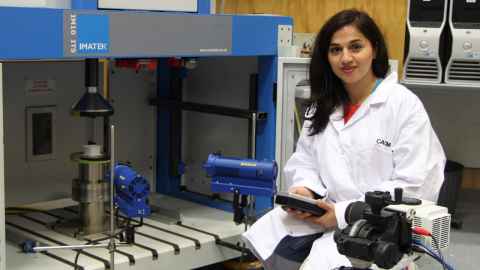Taking 3D printing to the next level: tailored devices for every user
28 November 2019
Maedeh Amirpour aims to take 3D printing for medical use to a new level of customisation thanks to her 2019 Rutherford Post-doctoral Fellowship.

Dr Amirpour works at the University of Auckland’s Centre for Advanced Composite Materials (CACM) where research is undertaken into synthetic and bio-based advanced composite materials. She has just received a prestigious two-year Rutherford Fellowship which will enable her to advance her research on the physics and behaviour of bio-based 3D printed lattice structures.
Dr Amirpour’s research will develop predictive computational models that will improve the design, mechanical performance and function of 3D-printed structures by tailoring their architectural and geometrical features.
The ability to tailor geometry with 3D printing combined with novel bio-based materials will enable the development of new products such as prosthetics and splints that are customised to specific user requirements, she says, while also making use of our abundant agricultural and biological resources.
“While the potential of 3D printing is being explored for wearable products, these are typically based on synthetic materials, and their application is limited by design complexities,” she says. “Where customisation is required, it’s time consuming and expensive. I think there’s a better way.”
Dr Amirpour works at engineering’s most interesting intersections, a combination of computational design, additive manufacturing, bio-based materials engineering and synthetic biology.
This new project relates to work she is also doing with SfTI’s National Science Challenge portfolio 5 with the aim of “3D/4D printing of bio-based composite”. This is a multidisciplinary collaboration between Scion, AgResearch, GNS, AUT, Victoria University, Massey University and University of Auckland.
Materials being developed in the SfTI programme will be utilised as part of her research. “Aotearoa is in a strong position to develop technology for 3D printing of bio-based materials such as lignin and cellulose, using abundant natural resources that can be converted into bio-based filaments.”
At CACM, Dr Amirpour is also involved in an MBIE Endeavour Research Programme on inductive power transfer (IPT), developed by Professors Grant Covic and John Boys at the University of Auckland.
The Rutherford Post-doctoral Fellowships aim to build human capability in research, science and technology, including social sciences and the humanities, by providing early career support for New Zealand’s brightest and most promising researchers. The Fellowships are administered by the Royal Society Te Apārangi.
Dr Amirpour has also received a prestigious Amelia Earhart Fellowship from the USA, which is awarded annually to only 30 women researchers worldwide.
“It would be impossible to count all the ways that Professor Bickerton, Associate Professor Battley and all my colleague at CACM helped me in my research career”.
Media contact
Prue Scott
DDI 09 923 5504
Mob 027 488 7078
Email p.scott@auckland.ac.nz